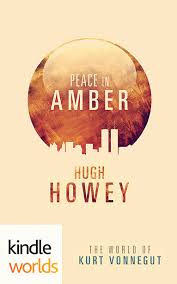
Only someone who really knows his craft and listens to his inner voices can write a story based on the world of Vonnegut’s Slaughterhouse Five that also includes not only a zoo run by aliens, but a touching restrospective of the events of September 11th.
For those unaware, Hugh Howey, bestselling self-published author of The Silo Saga and other titles, has been an ardent supporter of fan fiction, especially works written surrounding his own characters and scenarios in Wool. As a vocal advocate for authors to publish their licensed fan fic on Amazon Kindle Worlds platform, Howey himself has turned to the genre to express the thoughts he carried with him having witness the events of that day from his post as a boat captain in the marina below the towers.
Good e-Reader got the chance to ask Howey specifically about the process of creating a book whose purpose was decidedly different from his other writings, as well as the sense of community surrounding fan fiction.
Tim O’Reilly of O’Reilly Media said this morning at DBW: “John Green (The Fault in our Stars) is doing what all of us need to be doing,” regarding reader/fan engagement, support of fellow authors, community building, etc. I feel like you (Hugh) are another example of an author who doesn’t feel the need to compete with other authors, who happily shares his work with fans and fan fiction writers, who engages his readers on social media, and more. Can you give an explanation of why this is important to you, and what difference it makes to your readers?
I’ll tell you why I love my fellow writers: They have my back. There’s nothing quite like slaving over a manuscript for a few months, getting it polished and ready, hitting that “publish” button, falling asleep and enjoying the thrill of a book completed, and then waking up to reviews of your brand new baby on Amazon and an inbox flooded with “What’s next?”
I can’t write fast enough to sate readers’ thirst for stories. I rely on the rest of the writing community to keep people thrilled with the act of reading. The competition is not each other; the competition is all the myriad things people can do other than read. Like watch TV or surf the web.
Every great book is advertising for every other book written. The more the merrier. When I get those emails asking me “What’s next,” I point to John Green and tell them to read his book.
If Kurt Vonnegut was alive, do you envision his support for your book in much the same way that you have wholeheartedly supported other authors who have identified with The Silo Saga?
No way. Kurt was a curmudgeon, and I say that with ultimate fondness. He would be cynical about this because it wasn’t his idea. He’d be upset he didn’t do it first.
I think fan fiction is in line with Kurt’s philosophy toward writing. The guy was whimsical. One of his major characters, Kilgore Trout, was based on fellow science fiction author Theodore Sturgeon. He has places and people and themes that course through all of his works. It got to the point that he was writing fan fiction based on what he’d written before.
So I think he could be both against my writing in his world and be deliciously hypocritical for doing so. And that’s Kurt Vonnegut. And I love him for it.
Was the writing of Peace In Amber a way of healing from the events of that day, or was it more of a desperate need to get this story out of you? Or do you have other emotional ties to it?
It was both. I don’t think it could be one without the other. That day has been a scab I’ve been picking at for twelve years. Every book I write deals with it, sometimes obviously so. A building falls. A world burns. Characters watch, helpless. In I, ZOMBIE I wrote an homage to New York and to my loss in belief of free will, and I wrote obliquely about 9/11. But it wasn’t enough. As many times as I’ve cried in front of my laptop, writing in a room alone with my dog, I never really had that snot-faced and sobbing breakdown where something inside you pops and is allowed to heal. While writing Peace In Amber, I had that. Scabs are on their way to becoming scars.
Peace in Amber is available from Amazon’s Kindle Worlds platform.
Mercy Pilkington is a Senior Editor for Good e-Reader. She is also the CEO and founder of a hybrid publishing and consulting company.